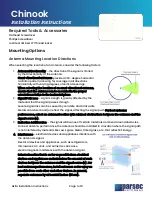
Falcon Installation Instructions
Page 1 of 6
Required Tools & Accessories
Phillips Screwdriver
5
/16”
Drill Bit
7/32” Drill Bit
Loctite or 3M Red 271 Thread locker
Mounting Options
Antenna Mounting Location Directions
When selecting the location of an antenna, consider the following factors:
1.
Antenna Directionality
–
the direction of the signal is limited by the directionality of the antenna.
Omni-directional antennas provide a 360-degree horizontal
radiation pattern, allowing for coverage in all directions
horizontally with varying degrees of vertical coverage.
When selecting the location of an omni-directional antenna,
ensure that the antenna can be mounted in the proper
orientation relative to the horizontal plane.
2.
Signal Path Loss
–
signal strength is greatly affected by the
materials that the signal passes through. Severe signal loss
can be caused by concrete and brick walls. Metals can
absorb and/or reflect the signal, affecting the signal path. For
best antenna performance, select an antenna location with minimal obstructions between the
antenna and the signal source(s).
3.
Reflection & Diffraction
–
the signal will bounce off certain materials and bend around obstacles.
For best antenna performance, the antenna should be installed in a location where the signal path
is not interfered with by materials like Low E glass, Metal,
Tinted glass, etc., that reflect RF Energy.
4.
Interference
–
electrical devices and appliances interfere
with the antenna’s signal.
Electrical devices and appliances, such as refrigerators,
microwaves, AC units, and cameras, can cause
electromagnetic interference with the antenna signal.
Select a location that is as far as possible from electrical
devices and appliances and minimizes the amount of such
devices between the antenna and the signal source(s). For
best antenna performance, install antennas as far away as
FALCON
Installation Instructions
























